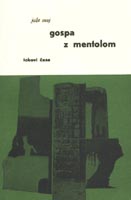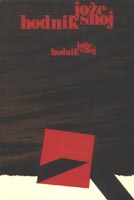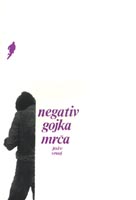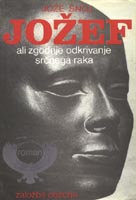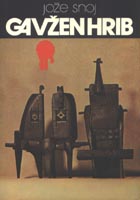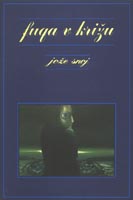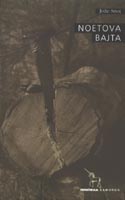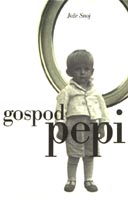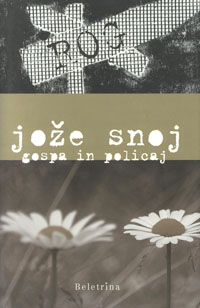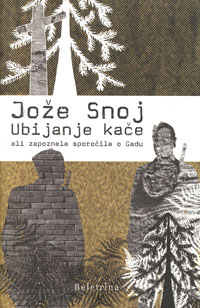


(Click on the picture to enlarge it)
|
|
Lady With Menthol Three short stories, written in the years
1962/63/64, compose this book: "Master for Death",
"Jackdaws", and "Lady with Menthol". Snoj shows here
already all his later prose subjects, motives and scenes: the childhood
during the war at Dolenjska, the fraternal war during revolution, the
"leaden" years after war in |
|
|
Corridor This novel begins a trilogy with the theme of revolution (the following two are Gallows Hill and Fugue in the Cross). In form and style, here prevails the written record of the hero's stream of consciousness that flows over the story so much that the story itself must again find the way out of it. The real narrative present time is the night wandering of a man who had a car crash and the real place is the corridor in the hospital. The delirium reveals the secret, which the hero was denying in the "leaden" times of "realsocialism" - he ran off the train that was transporting “home-guards” to Rog near Kocevje. To hide from revengers, he cut the five-armed star into his chest. The author plunges even deeper into the hero's subconsciousness - because of the then severely tabooed theme: he refers to the archetypical "memory" of cult sacrifices, and with the interpolation of an invented myth about slaughtering "men hunters" among pre-historic "people of the clouds", he reflects the post-war mass murders of the opponents/victims of the revolution. As mythical Svig with animal instinctive Gho, the hero remembers also his erotic failures. Corridor therefore means at the same time the infernal abyss of Kainhood and Eros. |
|
|
|
|
The Negative of Gojko Mrč With this novel, which is the pledge of the
tetralogy on the theme of post revolutionary time (the other parts of it are Joseph, Noah's Cottage and Mister Pepi), the author turns from
his childhood to the years of his maturing. In epic objectivisations - behind
them we recognize more or less personal items - he feels those years at the
same time as the restriction of life (communist dictatorship) and life anguish
(philosophy of the absurd), which means as a field of ideological cynicism
and philosophical nihilism. The novel is a portrait of an ambitious young
journalist Gojko Mrc; vulgar materialism leads him to a ruthless careerism
and criminal delicts. In the author's moral-ethic optics, he is therefore in
photo "negative". This hero is not portrayed just black or white,
because in his inner self he retains a germ of consciousness and of request
for the sense of being. When this germ thickens to an unbearable spiritual
emptiness, he commits suicide. There was only enough "positive" in
him for him to remain consistent in his nihilism. The defeated cynicism is
there like a warning Pyrrhic victory of a self-disastrous stubborn
rationalist. This is a story of the
splendor and misery of a selfish man, who is pushed to death by his panic and
fear, caused by the Computer of computers or - in Christian parable – by the
unconceivable God's accounts. |
|
|
Joseph or the Early Relevation
of the Heart Cancer The novel about Joseph, the second-class
citizen of a Communist regime and his "heart cancer", follows the
novel about the broken conformist Gojko Mrc. The hero Joseph supports the
dictator with his work, according to his abbilities, just as the biblical Joseph
supports Egypt. However, there is a difference (and here lies the
"sore"): his prehistory model supports the dictatorship on the firm
basis of faith in the inconceivable God's plans, while the modern Joseph
maintains it on the empty God's Nothing of the metaphysic nihilism. As such a
person - a decayed modern Egyptian Joseph - he introduces himself in a game
of words and sexual movements to his partner of a coincidental erotic night,
full of self-forgetting sex and thirst for sense; she euphorically harmonizes
with his attractive bitter romanticism. In the morning, when they go apart,
they remain deeply revealed but anonymous one to another. With his prison
experience and with betrayed love in the "leaden" times,
"Joseph" in the hotel room still remains alone - to the unknown
future. The ancient Egypt in which the author is transposing his hero is in
fact a provokingly clear parable of their contemporaneity. This novel is a
presentation of searching for God through a sensual research of body; it is a
book of dialogs of love and of (political) questionings; and it is also a
record of the stream of consciousness as a means of description which is
often reduced to spoken words and consequently to drama scenes. |
|
|
|
|
Gallows Hill In its essence, this is an autobiographical "novel about the war childhood", the second of the revolution trilogy. The epic objectivisation of it the author conceived as a fresco in the sense of magic realism with baroquely abundant use of dialect and historical language styles. The fresco shows the figures from the civil war that change into images from Christian iconography and these - interweaving legends and real events - into conflicting red Bolsheviks and white gardists (the principal of the Red - for example - into Devil, the executioners into apostles, the angels into capons etc.). The boy /writer reports about a ruthless murder of a boy child who survived the slaughter of his family for only few months. The novel parallel to this real event is put in the shape of a film scenario, which shows the siege of a pilgrimage church. On the intent of the devil's forces (the revolution in this magic-realistic phantasmagoria has the Devil's face) the father, the chief of the gardists, and the son in the files of the partisans should destroy each other in the battle. In reality, the killer survives the war and the boy's photo in a medallion on the gravestone (here reality again turns into surreal) starts to retrieve his features and to grow old with him, an old deranged combatant. Here happens a magically realistic "miracle" as a symbol of the impossibility of silencing the voice of conscience. |
|
|
Fugue in the Cross In Fugue in the Cross, in final part of the trilogy, the author deals with the climax of revolution - with the slaughter of its opponents, “homeguards”, at Rog. To express the atrociousness of this act, he refers to blasphemy which has a function of accusation and which is ironical in its grotesqueness. The counter-revolutionary who went mad and considers himself Josip Visarionovic Kristus (Christ instead of Stalin) imagines how he is going to save his life with new authorities: he believes he is going to succeed with a "project" how to use with benefit so much meat and blood. The abbreviation VKP(b) (Allinclusive Soviet Communist Party of Bolsheviks) is turning him into VKB(p) (Allinclusive Slovene Cook Books of Desserts-priboljšek in Slovene) /everything is a word-game, difficult to translate/; this "book" fills up with "recipes", how to prepare the Slovene boy in various tasteful possible ways. From this inner monologue that spreads also into descriptions of ideological-political situation during the war and of the butchery at Rog, and as well from the "enclosed" diary, we gather also the hero's military deeds and his lifesaving rise from the abyss. We also recognize the decay of the old and the manipulations of the new political powers through a parallel fictive "process" in which the actors are the historical persons (Kardelj - Gazdar=Boss, Kidric - Skalar=Slovene "translation" of the name Peter which means the rock, Rupnik, Rožman, Rosener, etc.) As an epilogue, there stands a drama about twin-brothers, which links the epilogue with the prologue of the novel - the madness of Josip Visarionovic Kristus. Namely, the "white" brother kills the "red" brother and therefore becomes crazy; as such he presents himself to the authorities. This novel is an epic "theme" in the manner of an endlessly repeating "fugue" - not in major or minor but in cross. |
|
|
|
|
Noah's cottage Noah's cottage is an ancient little house in the cleft slope of the Mozirska Mountain. In the word game drawn off the Noah's b/ark (in Slovene b/ark = barka and cottage = bajta) it is a metaphor for the "long day's journey into port" - the boat being the symbol of the heavy sea voyage, the cottage the symbol of the shore and of the lying at anchor. In real time (the euphoric years of the eighties and nineties), the author experiences erotic fulfillment as well as his new home; his Slovenehood experiences the attainment of national independence. He becomes the first person professor of his own and the national mythos. His soliloquy (the written record of the stream of consciousness as his psychological description) frames the concrete mountaineer environment; out of it step different peasant figures with their fates, their traditions and centuries-tested "wolf" instincts, which raise the reflection of vengeance (which they demand of the vanquished enemy) as the ontological evil. Into the literary language, which is shocked by the author's death premonition as the payment for the fulfilled wishes and longings, breaks their primary and juicy dialect speech. This book shows the author's most veristic epic and at the same time, most lyrical intimate prose - a novel, thinned down to a romanet (in Slovene novel = roman, so romanet would mean a new invented form of a novel). It is an enthusiastic hymn upon woman and Slovenia. |
|
Mister Pepi or the
Early Investigation of the Name
The personal self is certainly the closest and
the most authentic locus of reality for a modernistic writer; he abolishes
the classical "writer's/author's omniscience" as he writes down the
stream of the hero's consciousness. The name is the holder of the self, of
the ego; however, the title of this novel (Mister Pepi or the early Investigation of the Name) suggests,
that the center of this narrative will be the author himself. The writer
wants to "get to know" himself from his self and his close
relatives - father, mother, other relatives and ancestors, from his own
experiences and from the family tradition. Mister Pepi is therefore at the
same time a novel about subject/individual (the author reflects the fiasco of
his subjectivist will for power, which is the central theme of modern
European novels) and a family saga, full of touching short life
"novels" of persons appearing in it. Again this novel deals also
with the writer's young years during the war and after it and makes a link to Gallows Hill as a novel about the
war childhood; so this novel means the conclusion to both of his novel cycles
- the revolutionary trilogy and the post revolutionary tetralogy. It is
praise, panegyric, for his father and mother and as well hommage, dedication,
to the twentieth century, "the beautiful and the horrible, but the only
ours".
|
|
|
|
The Lady and the Policeman or the Late Account with Slovene Sorrow The frame of the novel goes back to the time after the attainment of Slovenia's independence and the time of victory over the commmunist dictatorship. In the retirement home an intellectual and still attractive middle aged woman, left a widow of a disident writer, meets a former member of the secret police. He was overseeing and altering the writers life path and development from the anticommunist collaborator to the anathematized writer. During the gradual revealing of his role, of which she knew nothing, the author is retrospectively showing the reasons and sources of the revolution and civil war in Slovenia. The author pays special attention to the tragical part of Edvard Kocbek (poet and revolutionary) in those times. It is revealed in the novel that the now aged "policeman" and at the same time refined intellectual, was also Kocbek's secret supervisor. |
|
Killing of the Snake or the Belated Reports about the Viper The novel's theme are the bolshevik revolution and the fratricidal war in Slovenia. It is based on a real event – the liquidation of a bandit guerilla with a "nom de guerre" Viper, who contributed to the formation of the so-called "Home Guard State" (collaborators with the german occupiers) in Polhograjski dolomiti near Ljubljana by committing numerous atrocities. The guerilla leadership itself sentences him to death for political reasons and charges two youngsters to carry out the task. The first is an urban proletarian, finishing his grammar school, and the second a forestry worker from a village. The author is describing their instinctive vitalistic struggle for their personal survival; the writer is trying to disencumber the narrative from all ideologicaly-political labels and to lead it to pure myth. Both liquidators survive, just like in nature persistant and durable weeds survive. |
|
|
|
|
Balkan Sobranie in press |
|
Back |
